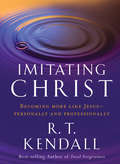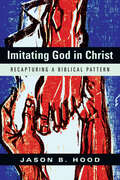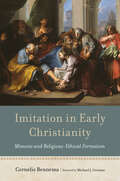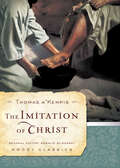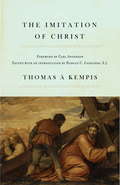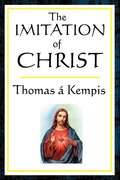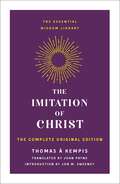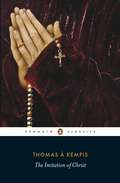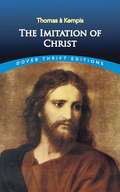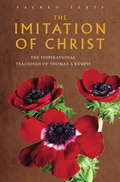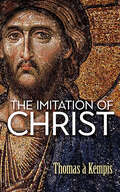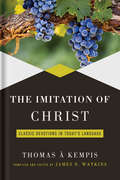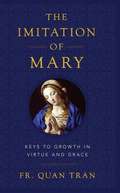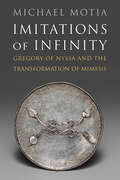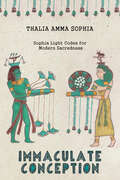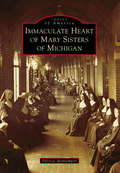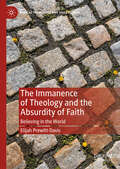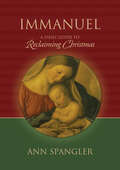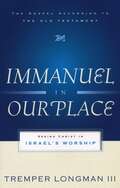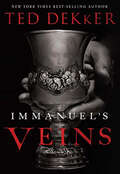- Table View
- List View
Imitating Christ: Becoming More Like Jesus
by R.T. KendallBeing a humble Christian does not make you a wimp---it makes you powerful! It's tough to be humble today, whether at home or in your community of relationships. R. T. Kendall wants you to understand that out of that meekness comes majesty and success. In Imitating Christ he carefully explains answers to questions like: •What does it mean to have the mind of Christ? •What motivated Jesus? •How can you become a servant to others? •When was Jesus vindicated, and who vindicated Him?Outlining Christ's capabilities, conscience, and credibility, Kendall invites you to dig deeper in your relationship with the Father.
Imitation in Early Christianity: Mimesis and Religious-Ethical Formation
by Cornelis BennemaWhat did exhortations to &“follow Jesus&” or &“imitate Christ&” mean to early Christians? Cornelis Bennema examines mimesis as a religious-ethical concept in early Christianity—the imitation of Jesus (and other exemplars) to become a better, more Christlike person. Situating appeals for imitation in the New Testament and Apostolic Fathers within the cultural and social context of the broader Greco-Roman world, Bennema shows how early Christian mimesis was not about literal replication, but instead was a creative, cognitive, and transformative means for shaping conduct and character. As part of this study, Bennema explores key questions about the historic origins of early Christian mimesis; the language that early Christian authors used to articulate the concept of mimesis; the scope, nature, and workings of mimesis in each major section of early Christian literature; and how early Christians navigated the challenges of imitating exemplars (such as Paul or Jesus) who were not physically present. Offering well-researched answers to these questions, Bennema provides readers with a nuanced and informative picture of exhortations to imitation in the New Testament and Apostolic Fathers.
The Imitation of Christ (Moody Classics)
by Thomas A'KempisThomas a Kempis was not a haphazard follower of Jesus. The depth of his masterpiece mirrors the life of a man who did whatever was necessary to imitate his own Savior. A Kempis lived as intentionally as he wrote. We must turn away from the things of this world, we must live sacrificially, we must be inundated with Christ's passionate teaching, and we must pray to be removed from distraction.A classic in every state of the word, The Imitation of Christ places the fruit of one man's single-minded devotion to God's calling on his life within the reach of every reader. May we all commit to be this effective in our emulation of Jesus. Moody ClassicsOf all the factors influencing our spiritual growth and development, pivotal books play a key role. Learning from those who have walked the path and fought the fight brings wisdom and strengthens resolve. And hearing the familiar chords of kingdom living sung by voices from other times can penetrate cultural barriers that limit our allegiance to the King. To this end, Moody Publishers is honored to introduce the first six volumes in what is to be an ongoing series of spiritual classics. Selected for their enduring influence and timeless perspective, these new editions promise to shape the lives of spiritual pilgrims for generations to come.
The Imitation of Christ (Moody Classics)
by Thomas A'KempisThomas a Kempis was not a haphazard follower of Jesus. The depth of his masterpiece mirrors the life of a man who did whatever was necessary to imitate his own Savior. A Kempis lived as intentionally as he wrote. We must turn away from the things of this world, we must live sacrificially, we must be inundated with Christ's passionate teaching, and we must pray to be removed from distraction.A classic in every state of the word, The Imitation of Christ places the fruit of one man's single-minded devotion to God's calling on his life within the reach of every reader. May we all commit to be this effective in our emulation of Jesus. Moody ClassicsOf all the factors influencing our spiritual growth and development, pivotal books play a key role. Learning from those who have walked the path and fought the fight brings wisdom and strengthens resolve. And hearing the familiar chords of kingdom living sung by voices from other times can penetrate cultural barriers that limit our allegiance to the King. To this end, Moody Publishers is honored to introduce the first six volumes in what is to be an ongoing series of spiritual classics. Selected for their enduring influence and timeless perspective, these new editions promise to shape the lives of spiritual pilgrims for generations to come.
The Imitation of Christ
by Harold C. Gardiner Thomas À KempisOnly the Bible has been more influential as a source of Christian devotional reading than The Imitation of Christ. This meditation on the spiritual life has inspired readers from Thomas More and St. Ignatius Loyola to Thomas Merton and Pope John Paul II. Written by the Augustinian monk Thomas à Kempis between 1420 and 1427, it contains clear instructions for renouncing worldly vanities and locating eternal truths. No book has more explicitly and movingly described the Christian ideal: "My son, to the degree that you can leave yourself behind, to that degree will you be able to enter into Me." With a new Foreword by Carl Anderson, the Supreme Knight and chief executive officer of the Knights of Columbus.
The Imitation of Christ
by Thomas A. KempisThis classic, second only to the Bible for religious instruction and inspiration, has brought understanding and comfort to millions for centuries. Written in a candid and conversational style, the topics include liberation from worldly inclinations, preparation and consolations of prayer, and the place of eucharistic communion in a devout life.
The Imitation of Christ: The Complete Original Edition (The Essential Wisdom Library)
by Thomas à KempisThomas à Kempis's The Imitation of Christ is a timeless devotional guide calling readers to a Christlike life, featuring an introduction by Jon M. Sweeney.One of the most beloved Christian devotionals, The Imitation of Christ was originally written in Latin during the fifteenth century and inspired countless readers to deepen their faith and build a stronger relationship with Christ. Kempis was focused on the contemplative, inner life and his work has been a trusted guide for generations of Christians in their own walks of faith.In the first two sections of the book, Kempis reflects on the spiritual and interior life, offering wisdom for those seeking to begin their own journey of reflection and contemplation. The final section of the book focuses on two imagined dialogues between Jesus and an unnamed disciple, which illuminate the totality of God’s love and grace.The Imitation of Christ is part of the Essential Wisdom Library, a series of books that seeks to bring spiritual wisdom—both modern and ancient—to today’s readers. This new edition of the classic text is a must read for seekers and believers alike.
The Imitation of Christ (The\five Foot Shelf Of Classics Ser.)
by Thomas à KempisOne of the most influential and well-loved books of Christianity, The Imitation of Christ by Thomas à Kempis appears here in Penguin Classics in a new translation by Robert Jeffery, with an introduction by Max Von Habsburg, notes, a chronology and further reading.The Imitation of Christ is a passionate celebration of God's love, mercy and holiness, which has stimulated religious devotion for over five hundred years. With great personal conviction and deep humanity, Thomas à Kempis (1380-1471) demonstrates the individual's reliance on God and on the words of Christ, and the futility of a life without faith, as well as exploring the ideas such as humility, compassion, patience and tolerance. Thomas spent some seventy years of his life in the reclusive environment of monasteries, yet in this astonishing work he demonstrates an encompassing understanding of human nature, while his writing speaks to readers of every age and every nation.Thomas à Kempis was born at Kempen near Dusseldorf in 1380. He received the priesthood in 1413. Thomas wrote many other devotional works besides The Imitation of Christ, his masterpiece, as well as biographies of Gerald Groote and Florentius Radewyn. He died in 1471.The Very Revd Robert Jeffery was born in 1935 and ordained in 1959. He has written on matters of Church history, spirituality, mission and ecumenism. In 1978, he became Archdeacon of Salop, and was Dean of Worcester from 1987-96 and subsequently Canon and Sub-Dean of Christ Church, Oxford. He retired in 2002 and is an Hon Doctor of Divinity of Birmingham University.Max von Habsburg is the author of Catholic and Protestant Translations of the Imitatio Christi 1425-1650 (2011).
The Imitation of Christ (Dover Thrift Editions Ser.)
by Thomas À Kempis Harold Bolton Aloysius CroftThis classic of Christian devotional literature has brought understanding and comfort to millions for centuries. Both Protestants and Catholics — as well as mystics and historians of religious thought — have studied these meditations on the life and teachings of Jesus, finding in them a path to prayer and spiritual guidance. Written in a candid and conversational style, The Imitation of Christ discusses liberation from worldly inclinations, recollection as a preparation for prayer, the consolations of prayer, and the place of eucharistic communion in a devout life. With its simple, readable text, this translation will appeal to new readers as well as to those already familiar with this religious classic.
The Imitation of Christ
by Stephan MackennaThe saintly Thomas à Kempis's classic guide to the spiritual and religious life. A book which has been loved and revered by devout Christians throughout the ages. Transcending all sectarian divisions, it emphasises the importance of the inward journey.
The Imitation of Christ
by Stephan MackennaThe saintly Thomas à Kempis's classic guide to the spiritual and religious life. A book which has been loved and revered by devout Christians throughout the ages. Transcending all sectarian divisions, it emphasises the importance of the inward journey.
The Imitation of Christ
by Stephan MackennaThe saintly Thomas à Kempis's classic guide to the spiritual and religious life. A book which has been loved and revered by devout Christians throughout the ages. Transcending all sectarian divisions, it emphasises the importance of the inward journey.
The Imitation of Christ
by Thomas à KempisWritten by the pious monk Thomas á Kempis, this timeless masterpiece offers wisdom and hope by providing precepts we can use to draw nearer to God and learn how best to grow in holiness through obedience and love. In the realm of Christian devotional literature, this religious classic has illuminated countless souls over the ages, transcending the boundaries of denominations, beliefs, and the confines of time. Within these pages, a spiritual journey unfolds intimately in heartfelt prose, providing guidance in the resistance of worldly desires, the significance of mental recollection as a precursor to meditative prayer, and finding gratitude and strength in the soothing embrace of divine consolation and the sacred rite of Eucharistic communion. One of the most influential works in Christian literature, the book is an excellent resource for historians, mystics, and those seeking private devotion.
Imitation of Christ: Classic Devotions in Today's Language
by James WatkinsThe timeless classic, The Imitation of Christ, is updated into modern English and arranged topically for daily devotions.
The Imitation of Mary: How to Grow in Virtue and Merit God's Grace
by Quan D. TranIn this book, the author shows how to imitate the twelve essential qualities of Mary in order to unleash a torrent of graces in life. He explains that, like any gift, grace must be received, opened, and used. As you learn how, you'll begin to acquire the temperaments, dispositions, and qualities that are most pleasing to God, and you'll serve as a channel of God's grace for others.
Imitations of Infinity: Gregory of Nyssa and the Transformation of Mimesis (Divinations: Rereading Late Ancient Religion)
by Michael MotiaWe do not have many definitions of Christianity from late antiquity, but among the few extant is the brief statement of Gregory of Nyssa (335-395 CE) that it is "mimesis of the divine nature." The sentence is both a historical gem and theologically puzzling. Gregory was the first Christian to make the infinity of God central to his theological program, but how could he intend for humans to imitate the infinite? If the aim of the Christian life is "never to stop growing towards what is better and never to place any limit on perfection," how could mimesis function within this endless pursuit?In Imitations of Infinity, Michael Motia situates Gregory among Platonist philosophers, rhetorical teachers, and early Christian leaders to demonstrate how much of late ancient life was governed by notions of imitation. Questions both intimate and immense, of education, childcare, or cosmology, all found form in a relationship of archetype and image. It is no wonder that these debates demanded the attention of people at every level of the Roman Empire, including the Christians looking to form new social habits and norms. Whatever else the late ancient transformation of the empire affected, it changed the names, spaces, and characters that filled the imagination and common sense of its citizens, and it changed how they thought of their imitations.Like religion, imitation was a way to organize the world and a way to reach toward new possibilities, Motia argues, and two earlier conceptions of mimesis—one centering on ontological participation, the other on aesthetic representation—merged in late antiquity. As philosophers and religious leaders pondered how linking oneself to reality depended on practices of representation, their theoretical debates accompanied practical concerns about what kinds of objects would best guide practitioners toward the divine. Motia places Gregory within a broader landscape of figures who retheorized the role of mimesis in search of perfection. No longer was imitation a marker of inauthenticity or immaturity. Mimesis became a way of life.
Immaculate Conception: Sophia Light Codes for Modern Sacredness
by Thalia Amma SophiaMiracles and phenomena of mystery between black magic, miracles and phenomena and religion. The first and last parts of Immaculate Conception tell the story of how a girl of the light becomes a real woman and let her wings unfurl. Through trials and tribulations, the reader is invited to reflect on testimonials of an initiate in a patriarchal society of dogma.At its core, this is a tale of a young woman in search of a life filled with love, spirituality, and the simple joys of existence, all while embracing her soul&’s destiny. Her story unfolds amidst the backdrop of stress, drama, &‘a-ha!&’ moments, and deep-rooted family traditions, guided by the steadfast presence of God&’s apostles.The second part is packed with rituals, channelled prayers, affirmations, and angelic protection invocations, to call on for a while or at various times. Special Key phrases have Sophia Codes that are lately coming to humanity for co-creating, healing, and expanding. With the support of Mother Mary and Archangels, Thalia Amma Sophia opens you to receive grace, brings you alignment and activation of your Higher Self; to neutralize the magnets pulling you into dysfunctional behaviour and past Life overlays!Prepare to awaken your innate ability to manifest desires and nurture creative ideas. Immaculate Conception extends an invitation to embark on a transformative journey where miracles, faith, and the boundless power of the human spirit intersect, promising the potential for grace, fulfilment, and profound transformation.
Immaculate Heart of Mary Sisters of Michigan (Images of America)
by Patricia MontemurriSince 1845, along the River Raisin in the southeastern Michigan town of Monroe, the Sisters, Servants of the Immaculate Heart of Mary (IHM) have distinguished themselves as educators, activists, and Catholic pioneers. At the congregation's peak, the motherhouse dispatched nearly 1,600 nuns to more than 100 schools across metropolitan Detroit and several states. For 175 years, the sisters taught the three Rs and the meaning of faith to nearly 700,000 students and established important metro Detroit institutions such as Marygrove College, Immaculata and Marian High Schools, and St. Mary Academy. Widely known by their initials, the IHMs have extended their reach worldwide. Monroe IHM members have served in key roles at the Vatican, as leaders of organizations representing Catholic sisters in the United States, as missionaries in Third World countries, and as groundbreaking activists and theologians. The Monroe IHMs today also attract lay women and men who dedicate themselves to the congregation's values and goals by becoming IHM Associates.
Immagini Scritte
by Annalisa Farina Antonio Carlos Mongiardim Gomes Saraiva"Immagini scritte" raccoglie 100 poesie scelte dall'autore e associa immagini a tema per sottolineare il contenuto e l'espressività dei testi poetici.
The Immanence of Theology and the Absurdity of Faith: Believing in the World (Radical Theologies and Philosophies)
by Elijah Prewitt-DavisThe constant inundation of the affect and information experienced by contemporary individuals exposes the tragic nature of the world, making nihilism an epistemologically reasonable response. To counter the threat of nihilism, Elijiah Prewitt-Davis argues that knowledge must be replaced by belief. Against the common protestant concept of belief as strictly personal and interior, he proposes believing in the world as an absurd and immanent faith in the impossible—a belief that allows one to see and feel the potentialities simmering within the world as it is. Following Gilles Deleuze call to “transform belief,” Prewitt-Davis explores how belief heightens an affective attachment to our embeddedness on the world, revealing the potentialities with which time is always pregnant. Believing in the world as it is paradoxically becomes the mode of transforming the world inasmuch as the potential for something impossibly new is always immanently present.
Immanuel: A Daily Guide to Reclaiming Christmas
by Ann SpanglerAnn Spangler believes it’s possible to transform the crazy, wonderful, stressful season we call Christmas into one of greater peace and deeper joy by recovering the gift of Advent.For hundreds of years, Christians have prepared for Christmas by carefully observing the four-week season leading up to it. What’s more, when Christmas did arrive, they celebrated not just for one day but for twelve! So four weeks for Advent and nearly two weeks for Christmas makes six weeks, which is why Ann Spangler has prepared this six-week Christmas devotional.Drawing from her bestselling books Praying the Names of God and Praying the Names of Jesus, Spangler selected six names or titles—including Immanuel, Yeshua, and Bright Morning Star. Each name offers a week’s worth of devotions focusing on God, the miraculous birth of his son, and the promise of his return. In Immanuel, you’ll discover a perfect balance of prayer, reflection, and study to help you open your heart fully to the birth of Jesus and all that it means.
Immanuel In Our Place: Seeing Christ In Israel's Worship (The Gospel According To The Old Testament Series)
by Tremper LongmanThis book provides fascinating insights into the Old Testament tabernacle and temple, the priesthood, the sacrifices, and festivals. More than that, it shows how Jesus is the fulfillment of Old Testament sacred space, sacred acts, sacred persons, and sacred time. An aid to pastors, teachers, and laymen in teaching and reading the Old Testament, this work will enrich our understanding of Christ and deepen our worship.
Immanuel's Veins
by Ted DekkerThis story is for everyone--but not everyone is for this story. It is a dangerous tale of times past. A love story full of deep seduction. A story of terrible longing and bold sacrifice. Then as now, evil begins its courtship cloaked in light. And the heart embraces what it should flee. Forgetting it once had a truer lover. With a kiss, evil will ravage body, soul, and mind. Yet there remains hope, because the heart knows no bounds. Love will prove greater than lust. Sacrifice will overcome seduction. And blood will flow. Because the battle for the heart is always violently opposed. For those desperate to drink deep from this fountain of life, enter. But remember, not everyone is for this story. "A heart-wrenching journey of redemption and hope that left me sobbing, laughing, and clinging to every word."--Donna McChristian, 44, Environmental Chemist
